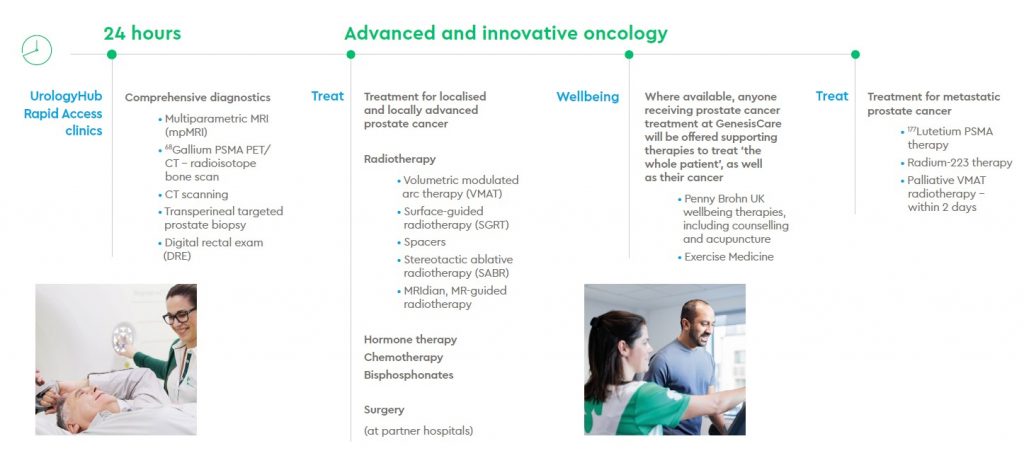- Healthcare Professionals
- Specialities
- Prostate oncology
- Prostate radiotherapy
Overview
Cutting-edge prostate pathway
Our dedicated prostate service is a comprehensive multidisciplinary and multimodality pathway that draws on best practice from many of the world’s leading cancer centres. Under the clinical governance of a team of expert uro-oncologists and surgeons it represents a whole-systems approach including:
- Rapid access clinics at our UrologyHubs
- Hypofractionated radiotherapy for low-impact treatment of localised disease
- Systemic anti-cancer therapies, including hormone therapy
- Prostate reirradiation for locally recurrent prostate cancer
- Theranostics – an innovative diagnostic and therapeutic approach to metastatic disease using radioisotopes
- Lifestyle and wellbeing therapies and personalised exercise medicine programmes are provided as part of our evidence-based package of care
Fast and accurate planning – within 48 hours
Our bespoke planning system uses automation and artificial intelligence (AI). This enables us to start treatments in as little as 48 hours of planning scan, including for palliative patients, and optimises the potential for hypofractionation – a shorter course of higher dose treatments.
Referrals
Contact our referrals and enquiries team to refer a patient for any of our services.

Prostate radiotherapy
Advanced radiotherapy in prostate cancer – improving quality of life
In the treatment of the most common cancer in men, recent advances in radiotherapy present new opportunities to improve outcomes and quality of life for patients. GenesisCare is at the forefront of innovation in radiotherapy and offer advanced techniques as part of a comprehensive prostate cancer pathway of care. These include the latest-generation linear accelerators at each of our centres and the UK’s first MRIdian, which is an MR-guided system for stereotactic ablative radiotherapy (SABR) at our centres in Oxford and Cromwell Hospital in London.
These radiotherapy systems use advancements in precision targeting to enable hypofractionated treatment plans – an effective dose delivered in fewer fractions and with less chance of toxicity to healthy tissue and resulting side effects. Combined with innovative approaches such as organ-sparing rectal spacers, radiotherapy is transforming opportunities to manage local and locally advanced disease as either an adjuvant or alternative to surgery.
Radical external beam radiotherapy is a preferred treatment option for localised prostate cancer, particularly for intermediate-risk and high‑risk disease.1 Numerous controlled studies have shown the benefits of dose-escalation and high-dose conformal radiotherapy with 1.8–2Gy daily fractions to a total dose of 74-79.2Gy over seven to eight weeks. This has become the standard schedule in the UK and led to the development of advanced techniques such as surface-guided radiotherapy (SGRT) and the use of rectal spacers, to sculpt dose distribution to reduce gastrointestinal (GI) toxicity.
Hypofractionation
More recently there has been a move to hypofractionated radiotherapy, driven by an understanding of the radiobiology of prostate cancer and the relative sensitivity of tumours and healthy tissue in response to dose per fraction and total dose. The linear-quadratic model, uses a ratio – the alpha/beta ratio (α/β) – to represent the cell survival of these different tissues in response to fraction size. The ratio is inversely related to changes in fraction size, therefore a low ratio indicates a greater sensitivity to increasing fraction size. For most tumours and acute healthy tissue responses the ratio is over 8.
However, for prostate cancer the ratio may be as low as 1.5, suggesting that a smaller number of high-dose fractions could improve the therapeutic ratio. This has led to an interest in hypofractionated approaches to prostate treatment.
Precision
Advanced techniques such as intensity-modulated radiotherapy (IMRT) and, more recently, volumetric arc radiotherapy (VMAT) offer highly conformal dose distribution, allowing high-dose without increasing toxicity to healthy tissue. These have enabled the success of moderate hypofractionated treatment plans, as an adjuvant or alternative to surgery.
VMAT has replaced conventional intensity-modulated radiotherapy to become the mainstay of curative radiotherapy in prostate cancer. The accuracy of VMAT is further enhanced when combined with SGRT – a sophisticated stereovision technology that monitors thousands of points on the patient’s skin during set-up and treatment, unlike other commonly used systems that rely on CT imaging – further increasing radiation exposure. This powerful system reduces positioning errors to improve the overall accuracy, as well as the speed and comfort of treatment.
We have developed evidence-based protocols for these treatment approaches and offer them as standard to all eligible patients.
Learn more
We provide advanced radiotherapy techniques as standard across all of our centres, including VMAT, SGRT and SABR. Read more about each of these services on our radiotherapy page for healthcare professionals.
Care plans are designed by a multidisciplinary team to facilitate peer review and clinical excellence
- GenesisCare
References
- Prostate cancer: diagnosis and management, NICE guideline. National Institute for Health and Care Excellence (NICE); 2019.
Rectal spacers to reduce toxicity
Rectal spacers reduce the long-term bowel, urinary and sexual function side effects of radiotherapy, and improve quality of life. Rectal spacers are a game changer in reducing the effect of toxicity to healthy tissues such as the bowel.
A rectal spacer is inserted between the rectum and the prostate to temporarily move the anterior rectal wall further away from the prostate. The spacer lasts for the entire course of prostate radiotherapy treatment and is completely absorbed by the patient’s body over time. Studies have shown that using rectal spacers in men undergoing radiotherapy for prostate cancer is safe and effective in creating perirectal space, reducing rectal irradiation and resulting in fewer patient-reported declines in bowel, urinary and sexual function, and improves quality of life (QOL).
At GenesisCare we offer rectal spacers at no extra cost to all patients with a prostate in situ prior to VMAT or SABR radiotherapy. We offer insertions under local anaesthetic at our Cambridge, Maidstone, Milton Keynes, Oxford and Windsor centres, or performed as a day-case procedure under general anaesthetic at one of our partner hospitals.
Learn more
We offer rectal spacers as part of our standard pre‑radiotherapy treatment, at no extra cost to patients or their insurers. Find out more about the benefits of spacers for prostate cancer radiotherapy.
5# SABR for prostate cancer
5# SABR for prostate cancer
Growing evidence has supported the use of extreme hypofractionation for patients with low to intermediate risk and selected high-risk localised prostate cancer.
Our 5# SABR for prostate cancer service is available at our centres in Chelmsford, Cambridge, Bristol, Birmingham, Nottingham, Maidstone and Elstree.
We always want to deliver an exceptional service that improves outcomes for our patients. Being able to offer this innovative treatment to our patients means that they benefit from:
- A suitable alternative to surgery
- No increase in gastrointestinal/genitourinary side effects compared to 20#
- A reduction in treatment time and less interruption to their daily life
- Additional benefit from rectal spacers to help reduce damage to surrounding healthy tissues such as the bowel, offered at no extra cost
Learn more
Find out more about our 5# SABR service for prostate cancer, the evidence base and how to refer.
MRIdian MR-guided radiotherapy
The UK’s first MRIdian MR Linacs
There is now a growing body of evidence in support of extreme hypofractionation – typically a delivery of 6-10Gy per fraction daily or weekly up to 35 or 50Gy. This is achieved using SABR, which uses targeted high-dose radiation beams. A recent advance in SABR delivery is MRIdian which combines a linear accelerator with a high definition MR scanner. It allows real-time adaptive planning and treatment, with organ motion monitoring and automatic gating that prevents beam delivery when the target is outside the treatment boundaries. This innovative SABR technique promises increased confidence that the target is hit every time with minimum damage to surrounding healthy tissues and initial studies show a low incidence of GI and GU toxicity in localised prostate cancer.1
We have introduced the first MRIdian MRI-guided radiotherapy (MRgRT) systems to the UK at our centres in Oxford and London and offer this modality as a specialist service within our SABR network. We have partnered with the University of Oxford to build a UK body of evidence around its use. This is the foundation for an emerging MRIgRT network that will put us at the forefront of exploring the possibilities of this innovative approach.
Learn more about MRIdian radiotherapy for prostate cancer
We’re proud to be the first independent healthcare provider in the UK to introduce the MRIdian available at our centres in Oxford and Cromwell Hospital in London which can be accessed by patients throughout the UK. Find out more about this innovative technology, including our case studies, the evidence base and how to refer.
Learn more about MRIdian radiotherapy for prostate reirradiation
We offer reirradiation for locally recurrent prostate cancer on the MRIdian at our centres in Oxford and Cromwell Hospital London. This innovative treatment is an alternative to long-term androgen deprivation therapy (ADT), that provides a safer radiotherapy treatment option that’s more accurate and with fewer side effects than conventional radiotherapy.
References
- Bruynzeel A, Tetar S, Oei S, Senan S, Haasbeek C, Spoelstra F et al. A Prospective Single-Arm Phase 2 Study of Stereotactic Magnetic Resonance Guided Adaptive Radiation Therapy for Prostate Cancer: Early Toxicity Results. International Journal of Radiation Oncology*Biology*Physics. 2019;105(5):1086-1094.
Safety and clinical excellence
Patient safety is at the heart of what we do
We are committed to an environment of clinical excellence, objectivity and accountability. Our prostate service is led by our Urology Reference Group – an advisory team of leading NHS clinicians who have been recruited due to their clinical expertise and experience in the techniques offered in the GenesisCare pathway. The role of the Urology Reference Group is to provide the necessary clinical oversight for a safe and effective uro-oncology service across the GenesisCare network from rapid access diagnostic clinics, through to advanced radiotherapy treatments and Theranostics.
This includes improved access to treatment, introducing new clinicians to the network, overseeing training and competency frameworks and contributing to the evidence base. They also implement a quality framework and measurement for VMAT radiotherapy and spacers. In addition, they drive the implementation of existing and emerging radiation technologies, in particular the MRIdian for treatment of prostate cancer, as well as academic collaboration with the University of Oxford.
Learn more
Our Clinical Reference Groups oversee the continuous process of clinical evaluation, using peer-group collaboration and data-driven insights to design and implement standardised treatment protocols across our centres. Find out more about the responsibilities of our Urology Reference Group and who is in the team.
CQC
We are CQC inspected and have a comprehensive governance framework that ensures safe treatment protocols, evaluates consultant practising privileges and reviews cases outside standard treatment protocols.
Patient app for PROMs collection
As an ongoing commitment to our patients and to monitor the long-term effects of treatment, we have developed a bespoke app for the collection of patient-reported outcome measures (PROMs). Supported by our centre teams, patients are encouraged to download the app to enable them to record their responses at designated intervals from the start of treatment.
Refer a patient
Referrals
Contact our referrals and enquiries team to refer a patient for any of our services.
Partner with us
We are always looking to collaborate with talented consultants. We can help you build your private practice with medical secretary support, practice management systems, website and marketing support and free consultation rooms. We welcome requests from individuals and academic institutions to access our state-of-the-art equipment and clinical support for treatment and research. You can also build your knowledge and network with peers at our many CPD events, with over 300 education and engagement events per year.
For more information, please contact: REM@genesiscare.co.uk
